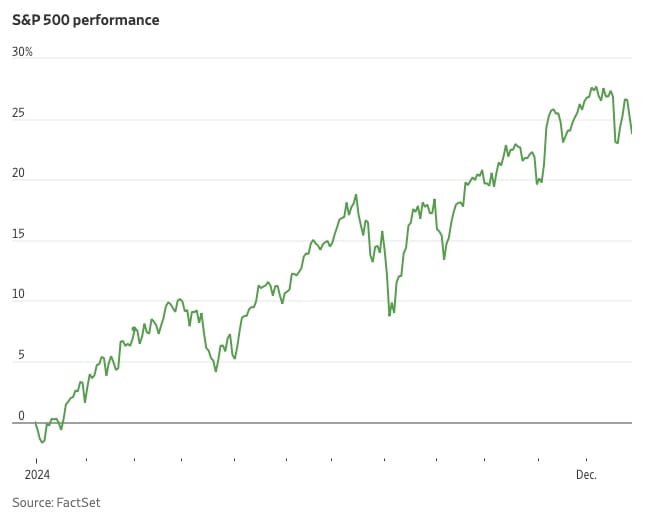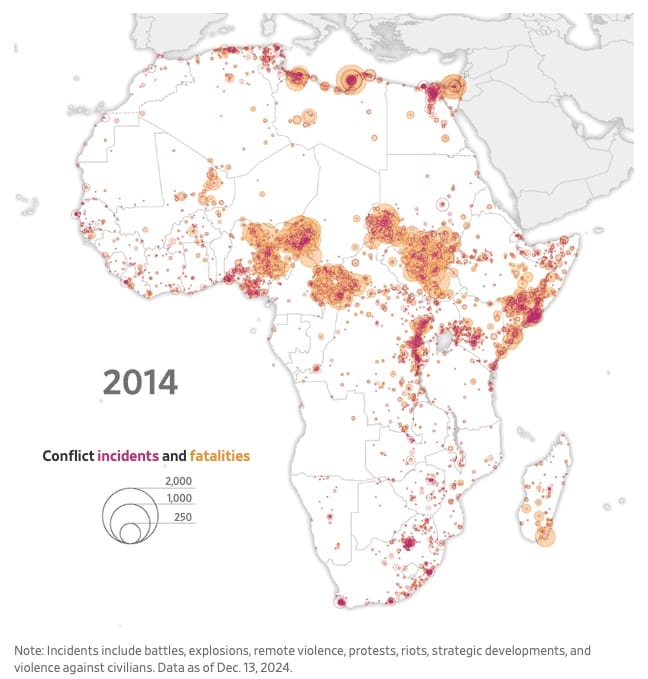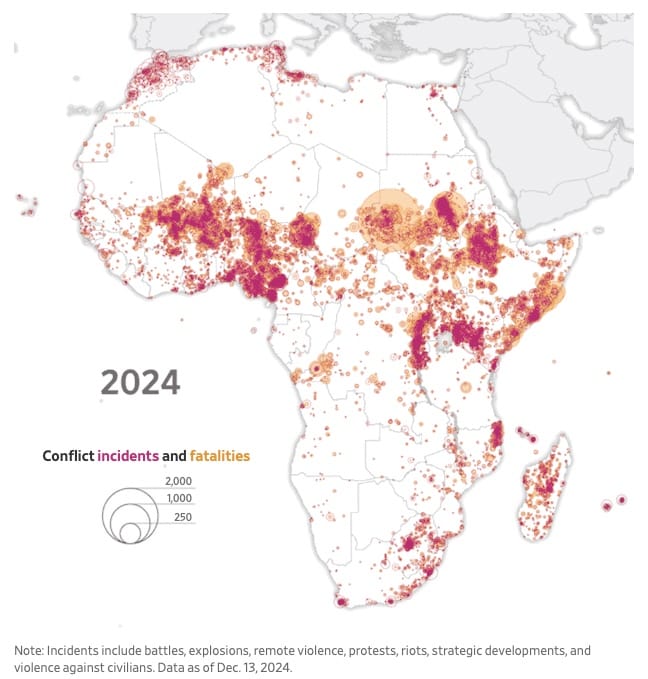December 31 2024
Record stock market run; Population decline ahead; Snapchat drug crisis; Musk finds Democrat allies; African conflicts expand; Dotcom peak

1. Markets Post Best Two-Year Run Since late-1990s
2. Global Population Decline Looms as Birth Rates Plummet
3. Snapchat Faces Lawsuits Over Teen Fentanyl Deaths
4. Leading Democrats Back Musk's Federal Spending Cuts
5. Africa's Widening War Zone Draws Little Attention
December 31, 1999: NASDAQ closes at 4,069.31, the peak of the dot-com bubble era
GET THE CITIZEN JOURNAL APP - FREE!
See the Ad Astra Podcast! Released on Apple and Spotify around 10a CST.
1. Markets Post Best Two-Year Run Since late-1990s
U.S. stocks roared to another blockbuster showing in 2024. Few expect such a torrid advance in the year to come. The S&P 500 has climbed 24%, notching 57 record closes as the economy remained healthy, inflation ticked lower and an AI-fueled rally in big tech stocks powered on. Even with a stumble in the last few trading days, the broad U.S. stock index is on pace for its best consecutive years since 1997 and 1998, according to Dow Jones Market Data, during the lead-up to the bursting of the dot-com bubble. The payoffs haven’t been limited to the equity market: Gold is on pace for its best year since 2010, while bitcoin more than doubled, vaulting above $100,000 for the first time before slipping below that mark.

Article Source: WSJ
2. Global Population Decline Looms as Birth Rates Plummet
Though few yet see it coming, a momentous turning point for humanity is looming immediately ahead. We are about to enter a new age of human history. Call it the epoch of the "population implosion". Because it is arriving quietly, without fanfare—almost on tiptoes—it is catching us by surprise. The world population explosion is almost over. With birth rates plummeting and sub-replacement fertility taking hold around the world, we are heading into an era of pervasive and indefinite de-population: starting already—and not just with countries, but entire geographic regions—eventually encompassing the planet as a whole. There is no avoiding the great depopulations that lie ahead—they are already "baked into the cake", fused into the foundations of societies all around the world by birth choices today's parents have already made. The only question is how soon and how fast these coming depopulations transform life as we know it. What lies ahead is a world of shrinking and aging societies, everywhere. "Net mortality societies" will be the new norm. Driven by unrelenting fertility collapse, family structures and living arrangements heretofore encountered only in science fiction novels will become commonplace, unremarkable features of everyday life. Our species has no collective memory of depopulation. Total human numbers have not declined for a very long time. The last long-term global depopulation was almost 700 years ago, in the wake of the Black Death: a plague that devastated China and India as well as Europe. But over the following seven centuries, world population surged almost 20-fold. And over the past century—within the lifetimes of the world's roughly 700,000 surviving centenarians—the human population has quadrupled. We know what ended the last global depopulation: the procreative power of our species (once the bubonic plague ran its course). We do not know what will end the next one. The coming depopulation is intentional—a first in the human condition. This time, long-term population decline will be due to humanity's procreative power itself—or rather the want of it, thanks to revolutionary worldwide reductions in the desire for children. So no one today can know how, or when, it might conclude—or even if it will.
Article Source: AEI
3. Snapchat Faces Lawsuits Over Teen Fentanyl Deaths
“I’m a survivor, and that’s bad for you, CEO of Snapchat, because, uh, uh, uh …” Michael Brewer can’t finish his sentence. The teenager’s speech is slow and slurred…a symptom of a brain injury caused by fentanyl poisoning. Michael is…a star witness in a lawsuit 64 families are pursuing against Snap Inc., alleging that the company’s Snapchat app helped fuel an epidemic of teen overdoses. At 13 he connected with a dealer he met on Snapchat and bought a pill that, unbeknownst to him, was laced with fentanyl. He took it, blacked out and stopped breathing. Now 17, Michael is a star witness because he’s one of only two teens in the case who can describe what happened firsthand. All the other kids are dead. Since 2020 drug overdoses, driven by fentanyl, have become one of the leading causes of death for teens in the US, killing more than 1,600 each year. The Drug Enforcement Administration has stressed the role social media is playing in the crisis, saying criminal drug networks are “now in every home and school in America because of the internet apps on our smartphones.” Although drug sales can be found on all social media platforms, teens, lawyers and law enforcement officials have singled out Snapchat, the yellow app with the ghost logo, whose 850 million monthly users send billions of messages every day. The DEA has linked some deaths to Snapchat, and the FBI is investigating the platform’s role in the spread and sale of fentanyl-laced pills as part of a broader probe into counterfeit drugs.

Article Source: Bloomberg
4. Leading Democrats Back Musk's Federal Spending Cuts
Elon Musk’s mission to slash US federal spending for Donald Trump is winning over a surprising cohort in Washington: Democrats who eye a chance to reduce defence spending and cut red tape. Senior politicians including senators Bernie Sanders and John Fetterman and a growing number of Democratic House members have expressed support for parts of Musk’s government efficiency crusade, which includes a pledge to cut $2tn from annual spending. “Defence contractors have been fleecing the American people for far too long,” Ro Khanna, a California Democrat whose district includes parts of Silicon Valley, told the Financial Times. Khanna said he was “willing to work with [Musk] to rein in wasteful spending at the Pentagon”.
Article Source: FT
5. Africa's Widening War Zone Draws Little Attention
An unprecedented explosion of conflicts has carved a trail of death and destruction across the breadth of Africa—from Mali near the continent’s western edge all the way to Somalia on its eastern Horn. Older wars, such as the Islamist uprisings in northern Nigeria and Somalia and the militia warfare in eastern Congo, have intensified dramatically. New power contests between militarized elites in Ethiopia and Sudan are convulsing two of Africa’s largest and most populous nations. The countries of the western Sahel are now the heart of global jihadism, where regional offshoots of al Qaeda and Islamic State are battling both each other and a group of wobbly military governments. This corridor of conflict stretches across approximately 4,000 miles and encompasses about 10% of the total land mass of sub-Saharan Africa, an area that has doubled in just three years and today is about 10 times the size of the U.K., according to an analysis by political risk consulting firm Verisk Maplecroft. In its wake lies incalculable human suffering—mass displacement, atrocities against civilians and extreme hunger—on a continent that is already by far the poorest on the planet. Yet, these extraordinary geopolitical shifts in sub-Saharan Africa have been overshadowed by higher-profile conflicts in Ukraine and the Middle East. That has led to less attention from global policymakers—especially in the West—grossly underfunded humanitarian-aid programs and fundamental questions over the futures of hundreds of millions of people.


Article Source: WSJ
December 31, 1999: The last trading day of the millennium saw the NASDAQ composite close at 4,069.31, capping off an incredible year where it gained 85.6%. This marked the peak of the dot-com bubble era.
Sponsors


Sources
1. https://www.wsj.com/finance/stocks/stocks-on-pace-for-best-two-years-in-a-quarter-century-c5b5f9b3?st=FpXUo3&reflink=article_copyURL_share
2. https://www.aei.org/research-products/working-paper/world-depopulation-prospects-and-implications/
3. https://www.bloomberg.com/features/2024-snapchat-teen-fentanyl-crisis-lawsuit/
4. https://on.ft.com/3ZQGeei
5. https://www.wsj.com/world/africa/africa-has-entered-a-new-era-of-war-c6171d8e?st=ZkyGLh&reflink=article_copyURL_share
